Books on consciousness
A list of books relating to the hard problem of consciousness. Regularly updated cos I keep finding new stuff all the time.
A list of books relating to the hard problem of consciousness. Regularly updated cos I keep finding new stuff all the time.
1997
 Raymond Martin
Raymond Martin
Self-Concern: An Experiential Approach to What Matters in Survival
(Cambridge 1997)
Martin argues that the distinction between self and other is not as fundamental a feature of our egoistic values as has been traditionally thought. He explains how the belief in a self as a fixed, continuous point of observation enters into our experience and reveals the implications of this for recent debates over personal identity and what matters in survival. See Cambridge | Amazon | Google
 Richard Swinburne
Richard Swinburne
The Evolution of the Soul
(Oxford 1997, 2nd revised edition)
A revised and updated version of Swinburne’s controversial treatment of the eternal philosophical problem of the relation between mind and body. He argues that we can only make sense of the interaction between the mental and the physical in terms of the soul, and that there is no scientific explanation of the evolution of the soul. Originally published in 1986. See Oxford | Amazon
 David Cockburn
David Cockburn
Other Times: Philosophical Perspectives on Past, Present and Future
(Cambridge 1997)
We view things from a certain position in time: we draw distinctions between what has happened, is happening, and will happen. Frequently, approaches to this feature of our lives embody serious misunderstandings of the character of the issues; they misconstrue the relation between metaphysics and ethics, and the way to characterize the kind of sense which tensed language has. Cockburn argues that the notion of 'reasons for emotion' must have a central place in any account of meaning, and that the present should have no priority in our understanding of tense. See Cambridge | Amazon | Google
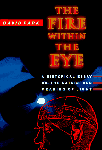 David Park
David Park
The Fire within the Eye: A Historical Essay on the Nature and Meaning of Light
(Princeton 1997)
Scientist and author David Park helps us reconceive the everyday phenomenon of light in profound ways, from spiritual meanings embedded in our culture to the challenging questions put forth by great scientists and philosophers. The book spans ancient Greek, Neoplatonic, and Arabic philosophy together with astrology, the metaphysics of Galileo and Kepler, and the role of mathematics and experimentation in modern physics. By creatively synthesizing a broad sweep of historical events and intellectual movements around the theme of light, Park offers us a unique perspective on Western civilization itself. See Princeton | Amazon | Google
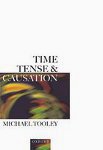 Michael Tooley
Michael Tooley
Time, Tense, and Causation
(Oxford 1997)
Traditional ‘tensed’ accounts of time hold that time has a direction and that its flow is part of nature. ‘Tenseless’ accounts hold that past, present and future are subjective features of experience rather than objective features of events. Tooley offers an intermediate approach. Agreeing that the universe is dynamic and that past and present are real while future is not, Tooley nevertheless rejects the existence of irreducible tensed facts. He accounts for time in terms of its relation to causation, arguing that the direction of time is based upon the direction of causation and that the key to understanding the dynamic nature of the universe is to understand the nature of causation. See Oxford | Amazon | Google
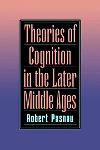 Robert Pasnau
Robert Pasnau
Theories of Cognition in the Later Middle Ages
(Cambridge 1997)
A major contribution to the history of philosophy in the later medieval period. Many of the issues that dominate philosophy of mind and epistemology today were hotly debated in the later medieval period. Pasnau offers a careful analysis of these debates, primarily through the work of Thomas Aquinas, John Olivi, and William Ockham. Each of these figures attempts to reconceptualise cognition along direct realist lines, criticising in the process the standard Aristotelian account. See Cambridge | Amazon | Google
 T. K. Johansen
T. K. Johansen
Aristotle on the Sense-Organs
(Cambridge 1997)
A detailed study of Aristotle’s theory of the sense organs. It looks at all five sense organs and shows how Aristotle’s views about them follow from his views about their function in perception. The book also shows how Aristotle’s explanation of why we have sense organs is fundamentally different from that of modern science. See Cambridge | Amazon | Google
 Wilfrid Sellars
Wilfrid Sellars
Empiricism and the Philosophy of Mind
(Harvard 1997)
First published in 1956, this essay by Sellars helped bring about a sea change in analytic philosophy. It broke the link which had bound Russell and Ayer to Locke and Hume – the doctrine of “knowledge by acquaintance.” Sellars’ attack on the Myth of the Given was decisive in turning analytic philosophy away from the foundationalist motives of the logical empiricists. (Introduction by Richard Rorty and study guide by Robert Brandom.) See Harvard | Google
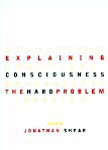 Jonathan Shear (ed.)
Jonathan Shear (ed.)
Explaining Consciousness: The Hard Problem
(MIT 1997)
At the 1994 landmark conference, ‘Toward a Scientific Basis for Consciousness,’ David Chalmers distinguished between the “easy” problems and the “hard” problem of consciousness. The former are to explain cognitive functions like discrimination, integration, and the control of behavior; the latter is to explain why these functions should be associated with phenomenal experience. In this book, researchers from all disciplines address this central topic. See MIT | Google
 Kathleen V. Wider
Kathleen V. Wider
The Bodily Nature of Consciousness: Sartre and Contemporary Philosophy of Mind
(Cornell 1997)
Wider discusses Sartre’s analysis of consciousness in Being and Nothingness in light of recent work by analytic philosophers, psychologists, and neuroscientists. She brings together phenomenological and scientific understandings of the nature of consciousness and argues that the two approaches can strengthen and suppport each other. See Cornell | Google
 Qassim Cassam
Qassim Cassam
Self and World
(Oxford 1997)
Cassam challenges the widespread view that we cannot be introspectively aware of ourselves as objects in the world. He argues that the self is not systematically elusive from the perspective of self-consciousness, and that consciousness of our thoughts and experiences requires a sense of our thinking, experiencing selves as shaped, located, and solid physical objects in a world of such objects. Awareness of oneself as a physical object involves forms of bodily self-awareness whose importance has seldom been properly acknowledged in philosophical accounts of the self and self-awareness. See Oxford | Google | Amazon
 John Searle
John Searle
The Mystery of Consciousness
(New York Review Books 1997)
In what began as a series of essays in The New York Review of Books, Searle evaluates the positions on consciousness of such well-known scientists and philosophers as Francis Crick, Gerald Edelman, Roger Penrose, Daniel Dennett, David Chalmers and Israel Rosenfield. He challenges claims that the mind works like a computer, and that brain functions can be reproduced by computer programs. See NYRB | Google | Amazon
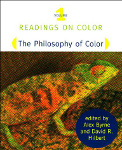 Alex Byrne & David Hilbert (eds.)
Alex Byrne & David Hilbert (eds.)
Readings on Color, Volume 1: The Philosophy of Color
(MIT 1997)
In two anthologies, Byrne and Hilbert survey important recent philosophical and scientific writings on color. The introduction to volume 1 provides a philosophical background and links the philosophical issues to the empirical work covered in volume 2. The bibliography in volume 1 is an extensive resource for those doing philosophical work on color. See MIT Press | Google | Amazon
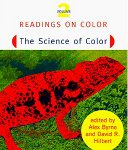 Alex Byrne & David Hilbert (eds.)
Alex Byrne & David Hilbert (eds.)
Readings on Color, Volume 2: The Science of Color
(MIT 1997)
The scientific selections in volume 2 present work in color science that is relevant to philosophical thinking about color; the material is comprehensive and sophisticated enough to be useful to the scientific reader. The introduction to volume 2 is an overview of color science; the volume also contains suggestions for further reading. See MIT Press | Google | Amazon
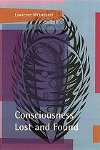 Lawrence Weiskrantz
Lawrence Weiskrantz
Consciousness Lost and Found
(Oxford 1997)
What can be learned about consciousness from people who have suffered brain damage such as amnesia which affects their awareness? Lawrence Weiskrantz, a distinguished neuropsychologist who has worked with such patients over 30 years, provides a unique perspective on one of the most challenging issues in science today. See Oxford | Google | Amazon
 Bernard J. Baars
Bernard J. Baars
In the Theater of Consciousness
(Oxford 1997)
Combining psychology with brain science, Baars brilliantly brings his subject to life with a metaphor that has been used to understand consciousness since the time of Aristotle – the mind as theater. Here consciousness is seen as a “stage” on which our sensations, perceptions, thoughts, and feelings play to a vast, silent audience (the immensely complicated inner-workings of the brain's unconscious processes). See Oxford | Google | Amazon
 Stephen Everson
Stephen Everson
Aristotle on Perception
(Oxford 1997)
Everson presents a comprehensive new study of Aristotle’s account of perception and related mental capacities. Recent debate about Aristotle’s theory of mind has focused on this account, which is Aristotle’s most sustained and detailed attempt to describe and explain the behavior of living things. Everson places this account in the context of Arisotle’s natural science as a whole, showing how Aristotle applies the explanatory tools he developed in other works to the study of perceptual cognition. See Oxford | Amazon | Google
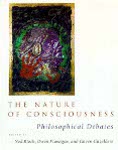 Block, Flanagan, Güzeldere (eds.)
Block, Flanagan, Güzeldere (eds.)
The Nature of Consciousness: Philosophical Debates
(MIT 1997)
A substantial introduction to the field, imposing structure on a vast and complicated literature, with sections covering stream of consciousness, theoretical issues, consciousness and representation, the function of consciousness, subjectivity and the explanatory gap, the knowledge argument, qualia, and monitoring conceptions of consciousness. Of the 49 contributions, 18 are either new or have been adapted from a previous publication. See MIT | Google

Self-Concern: An Experiential Approach to What Matters in Survival
(Cambridge 1997)

Martin argues that the distinction between self and other is not as fundamental a feature of our egoistic values as has been traditionally thought. He explains how the belief in a self as a fixed, continuous point of observation enters into our experience and reveals the implications of this for recent debates over personal identity and what matters in survival. See Cambridge | Amazon | Google

The Evolution of the Soul
(Oxford 1997, 2nd revised edition)
A revised and updated version of Swinburne’s controversial treatment of the eternal philosophical problem of the relation between mind and body. He argues that we can only make sense of the interaction between the mental and the physical in terms of the soul, and that there is no scientific explanation of the evolution of the soul. Originally published in 1986. See Oxford | Amazon

Other Times: Philosophical Perspectives on Past, Present and Future
(Cambridge 1997)
We view things from a certain position in time: we draw distinctions between what has happened, is happening, and will happen. Frequently, approaches to this feature of our lives embody serious misunderstandings of the character of the issues; they misconstrue the relation between metaphysics and ethics, and the way to characterize the kind of sense which tensed language has. Cockburn argues that the notion of 'reasons for emotion' must have a central place in any account of meaning, and that the present should have no priority in our understanding of tense. See Cambridge | Amazon | Google

The Fire within the Eye: A Historical Essay on the Nature and Meaning of Light
(Princeton 1997)
Scientist and author David Park helps us reconceive the everyday phenomenon of light in profound ways, from spiritual meanings embedded in our culture to the challenging questions put forth by great scientists and philosophers. The book spans ancient Greek, Neoplatonic, and Arabic philosophy together with astrology, the metaphysics of Galileo and Kepler, and the role of mathematics and experimentation in modern physics. By creatively synthesizing a broad sweep of historical events and intellectual movements around the theme of light, Park offers us a unique perspective on Western civilization itself. See Princeton | Amazon | Google

Time, Tense, and Causation
(Oxford 1997)

Traditional ‘tensed’ accounts of time hold that time has a direction and that its flow is part of nature. ‘Tenseless’ accounts hold that past, present and future are subjective features of experience rather than objective features of events. Tooley offers an intermediate approach. Agreeing that the universe is dynamic and that past and present are real while future is not, Tooley nevertheless rejects the existence of irreducible tensed facts. He accounts for time in terms of its relation to causation, arguing that the direction of time is based upon the direction of causation and that the key to understanding the dynamic nature of the universe is to understand the nature of causation. See Oxford | Amazon | Google

Theories of Cognition in the Later Middle Ages
(Cambridge 1997)

A major contribution to the history of philosophy in the later medieval period. Many of the issues that dominate philosophy of mind and epistemology today were hotly debated in the later medieval period. Pasnau offers a careful analysis of these debates, primarily through the work of Thomas Aquinas, John Olivi, and William Ockham. Each of these figures attempts to reconceptualise cognition along direct realist lines, criticising in the process the standard Aristotelian account. See Cambridge | Amazon | Google

Aristotle on the Sense-Organs
(Cambridge 1997)

A detailed study of Aristotle’s theory of the sense organs. It looks at all five sense organs and shows how Aristotle’s views about them follow from his views about their function in perception. The book also shows how Aristotle’s explanation of why we have sense organs is fundamentally different from that of modern science. See Cambridge | Amazon | Google

Empiricism and the Philosophy of Mind
(Harvard 1997)

First published in 1956, this essay by Sellars helped bring about a sea change in analytic philosophy. It broke the link which had bound Russell and Ayer to Locke and Hume – the doctrine of “knowledge by acquaintance.” Sellars’ attack on the Myth of the Given was decisive in turning analytic philosophy away from the foundationalist motives of the logical empiricists. (Introduction by Richard Rorty and study guide by Robert Brandom.) See Harvard | Google

Explaining Consciousness: The Hard Problem
(MIT 1997)

At the 1994 landmark conference, ‘Toward a Scientific Basis for Consciousness,’ David Chalmers distinguished between the “easy” problems and the “hard” problem of consciousness. The former are to explain cognitive functions like discrimination, integration, and the control of behavior; the latter is to explain why these functions should be associated with phenomenal experience. In this book, researchers from all disciplines address this central topic. See MIT | Google

The Bodily Nature of Consciousness: Sartre and Contemporary Philosophy of Mind
(Cornell 1997)
Wider discusses Sartre’s analysis of consciousness in Being and Nothingness in light of recent work by analytic philosophers, psychologists, and neuroscientists. She brings together phenomenological and scientific understandings of the nature of consciousness and argues that the two approaches can strengthen and suppport each other. See Cornell | Google

Self and World
(Oxford 1997)
Cassam challenges the widespread view that we cannot be introspectively aware of ourselves as objects in the world. He argues that the self is not systematically elusive from the perspective of self-consciousness, and that consciousness of our thoughts and experiences requires a sense of our thinking, experiencing selves as shaped, located, and solid physical objects in a world of such objects. Awareness of oneself as a physical object involves forms of bodily self-awareness whose importance has seldom been properly acknowledged in philosophical accounts of the self and self-awareness. See Oxford | Google | Amazon

The Mystery of Consciousness
(New York Review Books 1997)
In what began as a series of essays in The New York Review of Books, Searle evaluates the positions on consciousness of such well-known scientists and philosophers as Francis Crick, Gerald Edelman, Roger Penrose, Daniel Dennett, David Chalmers and Israel Rosenfield. He challenges claims that the mind works like a computer, and that brain functions can be reproduced by computer programs. See NYRB | Google | Amazon

Readings on Color, Volume 1: The Philosophy of Color
(MIT 1997)

In two anthologies, Byrne and Hilbert survey important recent philosophical and scientific writings on color. The introduction to volume 1 provides a philosophical background and links the philosophical issues to the empirical work covered in volume 2. The bibliography in volume 1 is an extensive resource for those doing philosophical work on color. See MIT Press | Google | Amazon

Readings on Color, Volume 2: The Science of Color
(MIT 1997)
The scientific selections in volume 2 present work in color science that is relevant to philosophical thinking about color; the material is comprehensive and sophisticated enough to be useful to the scientific reader. The introduction to volume 2 is an overview of color science; the volume also contains suggestions for further reading. See MIT Press | Google | Amazon

Consciousness Lost and Found
(Oxford 1997)
What can be learned about consciousness from people who have suffered brain damage such as amnesia which affects their awareness? Lawrence Weiskrantz, a distinguished neuropsychologist who has worked with such patients over 30 years, provides a unique perspective on one of the most challenging issues in science today. See Oxford | Google | Amazon

In the Theater of Consciousness
(Oxford 1997)

Combining psychology with brain science, Baars brilliantly brings his subject to life with a metaphor that has been used to understand consciousness since the time of Aristotle – the mind as theater. Here consciousness is seen as a “stage” on which our sensations, perceptions, thoughts, and feelings play to a vast, silent audience (the immensely complicated inner-workings of the brain's unconscious processes). See Oxford | Google | Amazon

Aristotle on Perception
(Oxford 1997)

Everson presents a comprehensive new study of Aristotle’s account of perception and related mental capacities. Recent debate about Aristotle’s theory of mind has focused on this account, which is Aristotle’s most sustained and detailed attempt to describe and explain the behavior of living things. Everson places this account in the context of Arisotle’s natural science as a whole, showing how Aristotle applies the explanatory tools he developed in other works to the study of perceptual cognition. See Oxford | Amazon | Google

The Nature of Consciousness: Philosophical Debates
(MIT 1997)
A substantial introduction to the field, imposing structure on a vast and complicated literature, with sections covering stream of consciousness, theoretical issues, consciousness and representation, the function of consciousness, subjectivity and the explanatory gap, the knowledge argument, qualia, and monitoring conceptions of consciousness. Of the 49 contributions, 18 are either new or have been adapted from a previous publication. See MIT | Google
Menu
 What’s a logical paradox?
What’s a logical paradox? Achilles & the tortoise
Achilles & the tortoise The surprise exam
The surprise exam Newcomb’s problem
Newcomb’s problem Newcomb’s problem (sassy version)
Newcomb’s problem (sassy version) Seeing and being
Seeing and being Logic test!
Logic test! Philosophers say the strangest things
Philosophers say the strangest things Favourite puzzles
Favourite puzzles Books on consciousness
Books on consciousness Philosophy videos
Philosophy videos Phinteresting
Phinteresting Philosopher biographies
Philosopher biographies Philosopher birthdays
Philosopher birthdays Draft
Draftbarang 2009-2024  wayback machine
wayback machine
 wayback machine
wayback machine